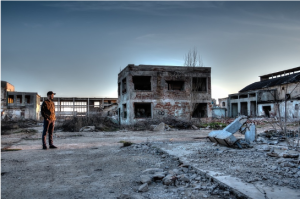
Covid 19 and law enforcement agencies during the pandemic crisis
Five biggest challenges
There is a tremendous influence between pandemic crisis of COVID 19, and law enforcement agencies. The fact that law enforcement agencies are one of the most important parts of the government after the health system, in a pandemic crisis like this in early 2020, we have to understand what are the mutual challenges of every country regarding the inner security of the state. The problem of quarantine, health self-protection, ongoing and new criminal investigations, reorganization, and civic disobedience are only some of many. The pandemic crisis is not very common, and unlikely other types of crises that law enforcement agencies deal with, this one is not short – we can say that it is a protracted crisis that can last for months. Here, we will try to identify interdependence between COVID 19 and law enforcement agencies, and 5 challenges for security and law enforcement agencies that have to be dealt with during the crisis and what is essential for them is that we have to conduct them in time – before they erupt and evolve from challenges to threats
- Lockdown / Quarantine

This will additionally burden the law enforcement agencies that had little time to prepare and organize. Stucked with daily jobs and obligations these agencies now have to deal with controlling thousands of people in self-isolation and the whole population during the curfew. A big challenge that requires enormous effort.
2. Spreading panic/False news

False news or misinformation is not a new phenomenon in the 21st century, but in a time of crisis, it can bring unrest and panic into the population, which can then result in a threat to the security. By addressing this problem we will stop, or at least reduce misinformation that leads to panic. Traditional media are not the problem – the problem rests in the social media. Social media is the place where everyone can write or share the information which we can use as a benefit but on the other had it can be an enormous problem for the public order. When some news, from a questionable source, is shared a couple of thousands of times, it gets more accepted and as adopted by readers, as the news from a recognized media company. This presents a major problem when the news is about the number of deaths, the number of infected people, deficiency of medical supplies, etc.
The law enforcement agencies and different departments that deal with cybercrime, have to participate in finding the sources of that misinformation, especially if that misinformation can be a criminal act, and process it. Also, the government has to publish this effort and to notify the public of most of these processes, because in that way the citizens will have information about the false news, and they will be more aware of the existence of such information.
1. 3. Internet crime
Connected with previous, is internet crime. Sharing false news, and putting them in a context where people take them as truth is not a crime. At least not a big one. What we mean with this internet crime, is more like organized scams, and even pedophilia and other types of crime where predators lurk through the social networks and different forums, seeking for a victim. It is not yet proven, but we have to suspect that this kind of crime will unfortunately rise. Why? Most of the countries imposed measures like lockdown, quarantine, and curfew. These measures can raise the usage of home computers, the internet, social networks, forums, etc. If this is so than it is expected that this type of crime will also rise.
The bigger issue, if we look cybercrime, was presented by the Interpol, where they explain three very dangerous types of cybercrime in this pandemic crisis – Malicious domains, Malware, and Ransomware (read more)

4. Guidelines for law enforcement agencies

The job of courageous people in law enforcement is to protect citizens from various threats and crime with prevention but also with bringing to justice of those who committed a crime. But to successfully do this, we have to know how to protect them. Men and women who are in constant contact with citizens and with each other. For that, agencies have to make a very important decision on how to protect their workers. And this is not only the equipment. Strict guidelines on how to act when in contact with an infected or suspicious person. Men and women who work in law enforcement have to keep the work even in these kinds of situations. They’re not as endangered as the ones in the health system but still – “in the first line”.
Secondly, reorganization and prioritization inside the agencies, because of two things
- lack of people because of new assignments and prioritizing between departments (patroling, speaking with citizens and giving them directions, patrolling and checking the ones in self-isolation, etc),
- minimizing the number of people in shifts (because of necessary social distancing regarding curtailment of infection).
Of course, this shouldn’t be done at the expense of the purview of law enforcement, and this is why it is so challenging.
5. The economic impact of a lockdown and quarantine
Many experts think that after this pandemic is over we will face another recession on a global scale, and this is not without arguments. The economy is slowing down, some companies are temporarily closed, and some are working but with reduced capacity. It would be extremely optimistic if we think that economy will exit this crisis without consequences. And, even though this is not an issue of the law enforcement agencies, if we look deeper we can predict social disturbing and unrest amid this situation. Governments are preoccupied with the current situation, but experts in law enforcement shouldn’t sit tight and wait for turmoil to come, and not only the riots but different types of misdemeanor and crime, violent and non-violent. The time after the pandemic crisis, some governments can be more challenging than the pandemic itself. For others, it will still demand commitment and expertise.

In the end, what can we learn from this situation?
Even though this crisis came unexpected and hit most of the countries, globally, we still have to learn from this. To get out this situation with some knowledge. First, we should never forget this situation as we did before. Governments should always keep in mind that this could happen. Law enforcement agencies, who are the foundation of security and safety of the country and its citizens have to have in mind the COVID-19 pandemic crisis and keep exercising with the knowledge from 2020. This knowledge should contain primarily from experience in reorganization and prioritization of work. This experience is valuable in every kind of crisis from time to time those agencies should train and conduct exercises and in that way stay alerted. With this valuable experience, we should be prepared to act before the challenge grows to be the threat.
In the end, we cannot forget international cooperation. Many countries were hit by the COVID-19 crisis and even though they had a similar situation, some of them experienced bigger challenges and diverse problems. With that in mind, it is essential to exchange experiences and knowledge because that is the way we will meet the next crisis a bit more prepared.


